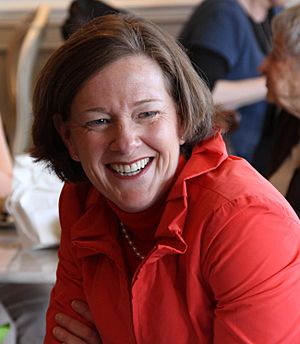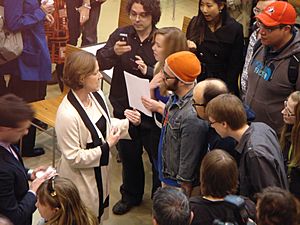Alison Redford facts for kids
Quick facts for kids
Alison Redford
|
|
|---|---|

Redford in 2012
|
|
| 14th Premier of Alberta | |
| In office October 7, 2011 – March 23, 2014 |
|
| Monarch | Elizabeth II |
| Lieutenant Governor | Donald Ethell |
| Deputy |
|
| Preceded by | Ed Stelmach |
| Succeeded by | Dave Hancock |
| Leader of the Progressive Conservative Association of Alberta | |
| In office October 1, 2011 – March 23, 2014 |
|
| Preceded by | Ed Stelmach |
| Succeeded by | Dave Hancock (interim) |
| Minister of Justice and Attorney General of Alberta |
|
| In office March 12, 2008 – February 18, 2011 |
|
| Premier | Ed Stelmach |
| Preceded by | Ron Stevens |
| Succeeded by | Verlyn Olson |
| Member of the Legislative Assembly of Alberta for Calgary-Elbow |
|
| In office March 3, 2008 – August 6, 2014 |
|
| Preceded by | Craig Cheffins |
| Succeeded by | Gordon Dirks |
| Personal details | |
| Born |
Alison Merrilla Redford
March 7, 1965 Kitimat, British Columbia, Canada |
| Political party | Progressive Conservative (2008–2014) |
| Spouses |
Robert Hawkes
(m. 1985; div. 1991)Glen Jermyn |
| Children | 1 |
| Alma mater | University of Saskatchewan |
| Occupation |
|
| Signature |  |
Alison Merrilla Redford (born March 7, 1965) is a Canadian lawyer and former politician. She was the 14th premier of Alberta, serving from October 7, 2011, to March 23, 2014. The premier is the head of the government in a Canadian province.
Redford was born in Kitimat, British Columbia, and her family moved around the world before settling in Calgary when she was a teenager. She made history by becoming the first female premier of Alberta.
In the 2008 provincial election, Redford was elected as a Member of the Legislative Assembly (MLA) for Calgary-Elbow. Before becoming premier, she was the Minister of Justice. She became premier after winning the leadership of her party, the Progressive Conservative Association of Alberta. She then led her party to victory in the 2012 provincial election.
On March 19, 2014, Redford announced she would step down as premier. A few months later, on August 6, 2014, she also resigned as an MLA.
Contents
Early Life and Career
Alison Redford was born on March 7, 1965, in Kitimat, British Columbia. Her family also lived in Nova Scotia and Borneo before moving to Calgary when she was 12. She graduated from the College of Law at the University of Saskatchewan in 1988.
During the 1990s, Redford worked as a legal advisor in Africa for organizations like the European Union and the Canadian government. She focused on human rights, education, and policy reform.
One of her important roles was as an International Election Commissioner for Afghanistan's first parliamentary elections in 2005. She also advised the Canadian government on its future role in Afghanistan. Redford is also a former member of the Girl Guides of Canada.
Political Beginnings
Working in Federal Politics
In the 1980s, Redford worked as a Senior Policy Advisor to Joe Clark, who was Canada's minister for foreign affairs. From 1988 to 1990, she worked in the office of Prime Minister Brian Mulroney. There, she helped get public opinions on Canada's foreign and defense policies.
Entering Provincial Politics
In 2008, Redford was elected as the MLA for the area of Calgary-Elbow. Premier Ed Stelmach then named her Minister of Justice and Attorney General. In early 2011, she left this position to run for leader of the Progressive Conservative Party.
Becoming Premier of Alberta
Winning the Party Leadership
On February 16, 2011, Redford announced she was running to become the new leader of the Progressive Conservative party. Many people thought she was an outsider in the race. In the first vote, she came in second place to Gary Mar, who was the favorite.
However, Redford had gained a lot of support from new party members. Her promise to reverse cuts to education funding was very popular with teachers and the public. In the final round of voting on October 2, 2011, Redford won with 51% of the vote. She was sworn in as Alberta's 14th premier five days later.
The 2012 Provincial Election
On March 26, 2012, an election was called for April 23. At first, polls suggested that the rival Wildrose Party, led by Danielle Smith, might win. Many thought this would end the Progressive Conservatives' 40-year run in government.
On election night, Redford's Progressive Conservatives won a surprise victory. They took 61 of the 87 seats in the legislature, securing another majority government. With this victory, Redford became the first woman in Alberta's history to lead a political party to an election win.
As part of her campaign, Redford promised to build 50 new schools and fix up 70 more. She also wanted to create a new Department of Human Services to better support non-profit groups.
Time as Premier
Changes to Government Spending
As premier, Redford made changes to how the government spent money. She ended extra pay for MLAs who served on committees after a scandal about a "No-Meet Committee" caused public anger. She also introduced new rules to make government spending more public, especially for travel expenses.
Disagreements with Unions
Redford's government faced criticism from some labour unions. They were unhappy with cuts to post-secondary education funding. The government also passed new laws, called Bill 45 and Bill 46, that limited the rights of some government workers to strike or go to arbitration over their pay.
These laws led to protests and legal challenges from unions representing thousands of workers. After Redford left office, the new premier, Jim Prentice, repealed Bill 45 and reached a new pay agreement with the unions.
Energy and Pipelines
Redford strongly supported Alberta's oil industry. She had a public disagreement with British Columbia's premier, Christy Clark, over building a pipeline to the west coast. Clark wanted B.C. to get a share of the money from the pipeline, but Redford disagreed. They eventually reached a basic agreement in 2013.
Controversy and Resignation
In 2013, Redford attended the funeral of Nelson Mandela in South Africa. A controversy started when the public learned the government paid about $45,000 for her trip. This included a private flight to return home. After public pressure, Redford apologized and paid the money back.
This event led to more questions about her government's spending. Critics pointed to high salaries for her staff and expensive travel. Her popularity dropped, and some members of her own party began to criticize her leadership.
Facing a revolt from within her party, Redford announced on March 19, 2014, that she would resign as premier. Her last day was March 23, 2014.
Life After Politics
After resigning as premier, Redford stayed on as the MLA for Calgary-Elbow for a few months. On August 6, 2014, she resigned from the legislature completely. In a public letter, she said she took responsibility for her decisions and planned to return to teaching and international development work.
In 2017, an ethics commissioner cleared Redford of a conflict of interest accusation related to a government lawsuit against tobacco companies. The commissioner found she had acted with "sensible and principled reasoning."
Later that year, Redford took a job in Kabul, Afghanistan. She worked as a policy advisor to help the Afghan government manage its natural resources, like mines and oil.
In 2016, Redford's official portrait was unveiled. It now hangs in the Alberta Legislature Building along with the portraits of all the other former premiers.
Election results
| Alberta general election, 2012: Calgary-Elbow | ||||||||
|---|---|---|---|---|---|---|---|---|
| Party | Candidate | Votes | % | ±% | ||||
| Progressive Conservative | Alison Redford | 11,198 | 58.09 | +16.01 | ||||
| Wildrose | James Cole | 5,509 | 28.58 | +21.97 | ||||
| Liberal | Beena Ashar | 1,067 | 5.53 | −33.67 | ||||
| New Democratic | Craig Coolahan | 761 | 3.95 | +1.96 | ||||
| Alberta Party | Greg Clark | 518 | 2.69 | – | ||||
| Evergreen | William Hamilton | 225 | 1.17 | −2.44 | ||||
| Total valid votes | 19,278 | 100.00 | – | |||||
| Total rejected ballots | 257 | – | – | |||||
| Turnout | 19,535 | 58.44 | +12.60 | |||||
| Eligible voters | 33,430 | – | – | |||||
| Alberta general election, 2008: Calgary-Elbow | ||||||||
|---|---|---|---|---|---|---|---|---|
| Party | Candidate | Votes | % | ±% | ||||
| Progressive Conservative | Alison Redford | 6,130 | 42.08 | +3.75 | ||||
| Liberal | Craig Cheffins | 5,711 | 39.20 | −6.57 | ||||
| Wildrose Alliance | Dale Nelson | 963 | 6.61 | +2.44 | ||||
| Independent | Barry Erskine | 948 | 6.51 | |||||
| Green | Jonathon Sheffield | 526 | 3.61 | −1.99 | ||||
| New Democratic | Garnet Wilcox | 290 | 1.99 | −1.31 | ||||
| Total valid votes | 14,568 | 100.00 | ||||||
| Total rejected ballots | 77 | |||||||
| Turnout | 14,645 | 45.84 | ||||||
| Eligible voters | 31,947 | |||||||
| Progressive Conservative gain from Liberal | Swing | +5.16%
|
||||||
 | James B. Knighten |
 | Azellia White |
 | Willa Brown |


